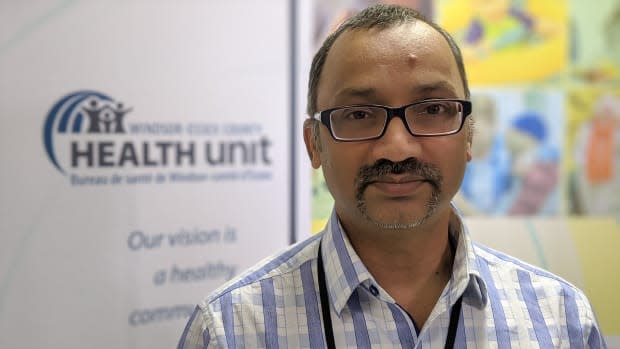Windsor-Essex sees 'concerning' spike in syphilis cases between 2017 and 2019
The Windsor-Essex County Health Unit is warning the public about a "significant" spike in the number of new syphilis cases — a 134 per cent increase from 2017 to 2019.
Syphilis is spread through oral, genital, or anal sex with an infected person and can cause serious health problems if left untreated. It can also be passed to a child during pregnancy.
If left untreated, syphilis can progress through four stages of infection, with symptoms ranging from sores and rash to multi-organ system damage.
During the same time period, there was a 25.6 per cent provincial increase, although the overall rate in Ontario remains higher than in Windsor and Essex County, according to health officials.
"We want to take this opportunity to do more work in the community, make them aware, do some education about the risk factors that predisposes some of the individuals to contract syphilis in the first place," said WECHU's medical officer of health Dr. Wajid Ahmed.
Laboratory-confirmed cases of syphilis in Windsor and Essex County (WECHU):
2019: 81
2018: 55
2017: 34
2016: 28
2015: 29
2014: 23
2013: 43
2012: 25
2011: 21
2010: 32
Sexually-transmitted and blood-borne infections, such as HIV/AIDS, chlamydia, gonorrhea, hepatitis B, hepatitis C and syphilis, account for the region's "largest burden of all Diseases of Public Health Significance," representing 71 per cent of reported cases.
Factors behind the spike
Ahmed said there are a number of factors which contribute to the timing of this spike.
"Over the decades, we have made significant advancement in HIV cases. Now, people are living with HIV similarly to a chronic disease. That has resulted in people maybe not using appropriate precautions," said Ahmed.
"Many of the individuals who contracted syphilis, they reported that they were not using condoms, which is a concern because we want to make sure people are engaging in safe sexual practices."
Another risk factor Ahmed pointed to is people engaging with multiple sexual partners using "hook-up" apps.
Dr. Michelle Murti, a physician with Public Health Ontario, said these factors make it difficult for the province to keep up with new cases.

"Somebody who does identify that they've had syphilis, it's hard for them to necessarily go back and tell those people what they might have been exposed to — that they should get tested and treated as well," she said.
According to Murti, women accounted for less than 100 cases out of about 2,000 across the province in 2019. But that number is getting higher.
"The worry about that is particularly for women in their childbearing age, because of the risk of congenital syphilis," said Murti. "Babies born with congenital syphilis have a variety of health issues and even risk dying from that congenital syphilis."
For Murti, it's not surprising that syphilis rates in Windsor-Essex are rising, considering the numbers have increasing "nationally and internationally for the last six or seven years."
"The vast majority of cases that we're seeing in Ontario are amongst men — and particularly men who identify as having sex with other men," she said.
Many of the individuals who contracted syphilis, they reported that there were not using condoms, which is a concern because we want to make sure people are engaging in safe sexual practices. - Dr. Wajid Ahmed, Windsor-Essex County Health Unit
The health unit is encouraging people to engage in safer sex practices "such as wearing a condom and are further encouraged to get tested."
Health officials in Windsor-Essex point to one complication of syphilis as a significant concern — neurosyphilis. This can lead to headaches, dizziness, dementia, difficulty coordinating muscle movements and even a change in personality.
"If that initial infection gets unnoticed and untreated, then it leads to all those secondary complications. So we want to make sure that we're making an earlier diagnosis," said Ahmed.
"We are encouraging people to get tested — especially if they've had more than one sexual partner."
In 2019, neurosyphilis cases comprised nearly 10 per cent of all syphilis cases in Windsor and Essex County — and the number has been steadily growing — reaching three per cent in 2017 and 5.5 per cent in 2018.
There has also been a shift in the age of those diagnosed. From 2010 to 2018, all neurosyphilis cases were found in people older than 45. However, half of 2019's cases were diagnosed in individuals 20 to 44 years of age.

Back in December, the Middlesex-London Health Unit (MLHU) declared a community-wide syphilis outbreak. A total of 113 cases were reported in 2019, enough to exceed the average provincial rate.
When asked if officials in Windsor-Essex are considering declaring an outbreak for this region, Ahmed said that's not on the table right now.
"The numbers for that health unit, it was higher than ours. So we are not there yet. But it's still significant enough to raise red flags," said Ahmed.
"We are hoping we can contain it and try and bring those numbers down — ideally zero."

